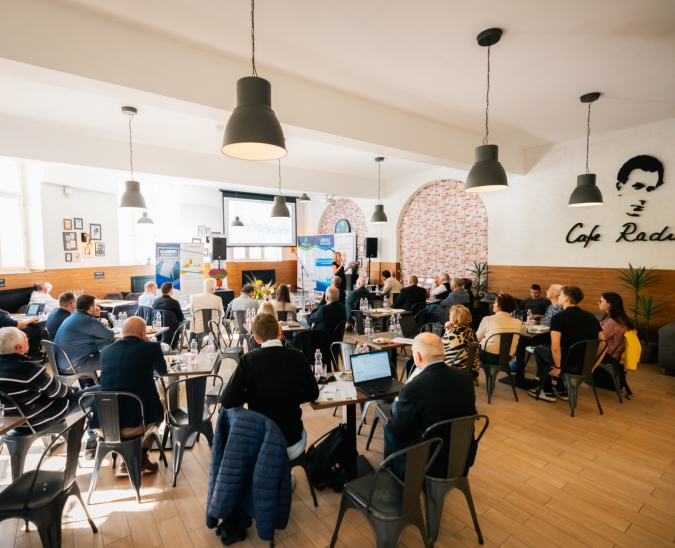
Prof. Dr. István Bíró, President of the Archenerg Metal Cluster, greeted the attendees, emphasizing that inter-cluster cooperation is crucial for economic growth and competitiveness. He stressed that without collaborative thinking and a partnership between institutions, businesses, and development policy actors, the region's long-term development cannot be achieved.
Following the welcome address, Patrik Dominik Nagy, Project Manager of the Archenerg Metal Cluster, provided a brief overview of the conference's objectives and structure. He stated that the goal was to jointly discuss the future of regional development guidelines and economic incentives with the involvement of domestic and international experts, with a special focus on strengthening synergies between local developments and enterprises.
The first professional presentation of the morning was delivered by Dr. Csaba Molnár, Director-General of the Csongrád-Csanád County Government Office, titled “Regional Development Principles and Goals in Csongrád-Csanád County in Light of the Competitive Districts Program.” He spoke about the development of Hungarian public administration, its historical and current challenges. He highlighted that ensuring public security is a fundamental element of regional development, as there is no sustainable economic growth without a stable societal background. Molnár also provided a historical perspective, recalling that the foundations of modern public administration and regional development were laid by the emergence of civil commerce, investments, and legislation as early as the beginning of the 19th century. He emphasized that these principles can still guide the county's development today.
Next, Dóra Csernus, Director of Energy and Environmental Policy at the Egyensúly Intézet, gave her presentation titled “Sustainability as a Competitive Advantage: Future-Proofing Businesses and Regions.” Csernus discussed how sustainability is not merely an environmental aspect but can also be a genuine economic advantage. She highlighted that “the green advantage is the new competitive advantage,” as businesses that respond to environmental challenges in a timely manner can maintain a more stable and profitable operation in the long term.
The participation of the Egyensúly Intézet is key because it complements the topics of economic stimulus and regional development with a perspective on future-proofing and sustainability. The role of the Institute's Director of Climate, Energy, and Environmental Policy, Dóra Csernus, is particularly important as her presentation focuses on “Sustainability as a Competitive Advantage,” emphasizing the significance of a holistic approach. This approach is essential for today's businesses, as it considers long-term environmental and social impacts in addition to short-term financial gains. Thus, the Institute ensures that the conference not only concentrates on immediate revenue-boosting and contribution-reducingstrategies but also helps cultivate a responsible and innovative entrepreneurial mindset appropriate for future challenges, thereby guaranteeing stable and sustainable growth for cluster members.
Dr. Ferenc Fedor, geologist engineer, economist, and President of IKOSZ (National Federation of Innovative Clusters), presented on “The Role of the National Federation of Innovative Clusters in Inter-Cluster Cooperation and Increasing the International Visibility of Clusters.” He spoke about the crucial role of inter-cluster cooperation and knowledge sharing in the development of the domestic innovation network, noting that increasing international visibility can bring significant economic advantages.
The following lecture was given by György Tóth and György Tóth Jr., experts from Career Brand Finance Kft., titled “Solutions for Increasing Revenue and Reducing Contributions – Let Your Business Grow Rich, Not the Tax Authority!” They used practical examples to demonstrate how Hungarian businesses can increase their revenues and reduce their burdens through tax optimization and conscious financial planning.
The conference's closing presentation was delivered by Miklós Somogyi, innovation expert and Managing Director of CHIC Nonprofit Kft., titled “The State of Domestic Innovation Through the Eyes of an Innovation Manager.”Somogyi emphasized in his presentation that developing an innovation mindset and cooperation in Hungary is essential for domestic businesses to be competitive on an international level.
The presentations were followed by a panel discussion/forum, where the speakers and the audience shared their experiences in an informal conversation about the future of development policy, sustainability, and innovation. The forum was moderated by Dr. Gyula Nagy, Vice President of the Archenerg-Metál Cluster.
The event concluded with András Gonda, Cluster Manager of the Archenerg Metal Cluster, offering thanks to the speakers and participants, emphasizing that the cluster's goal remains the strengthening of regional economic cooperation, the promotion of sustainable development, and the support of innovation.
The Archenerg-Metál Cluster and the Egyensúly Intézet conference, “Rethinking the Future Strategy,” created a crucial forum for businesses operating in the renewable energy, mechanical engineering, and metal industries to lay the foundation for future-proofing. The central message of the conference is that the competitiveness of Hungarian small and medium-sized enterprises can be boosted by the practical utilization of the new elements of regional development strategy, networking among clusters, and the integration of sustainability aspects. The informal "café" style forum, involving governmental commissioners and experts, provided concrete guidance on revenue generation and cost reduction, while simultaneously highlighting the importance of innovation, R&D, and international visibility, ensuring the strategic preparation of cluster members for the economic green and digital transition.
